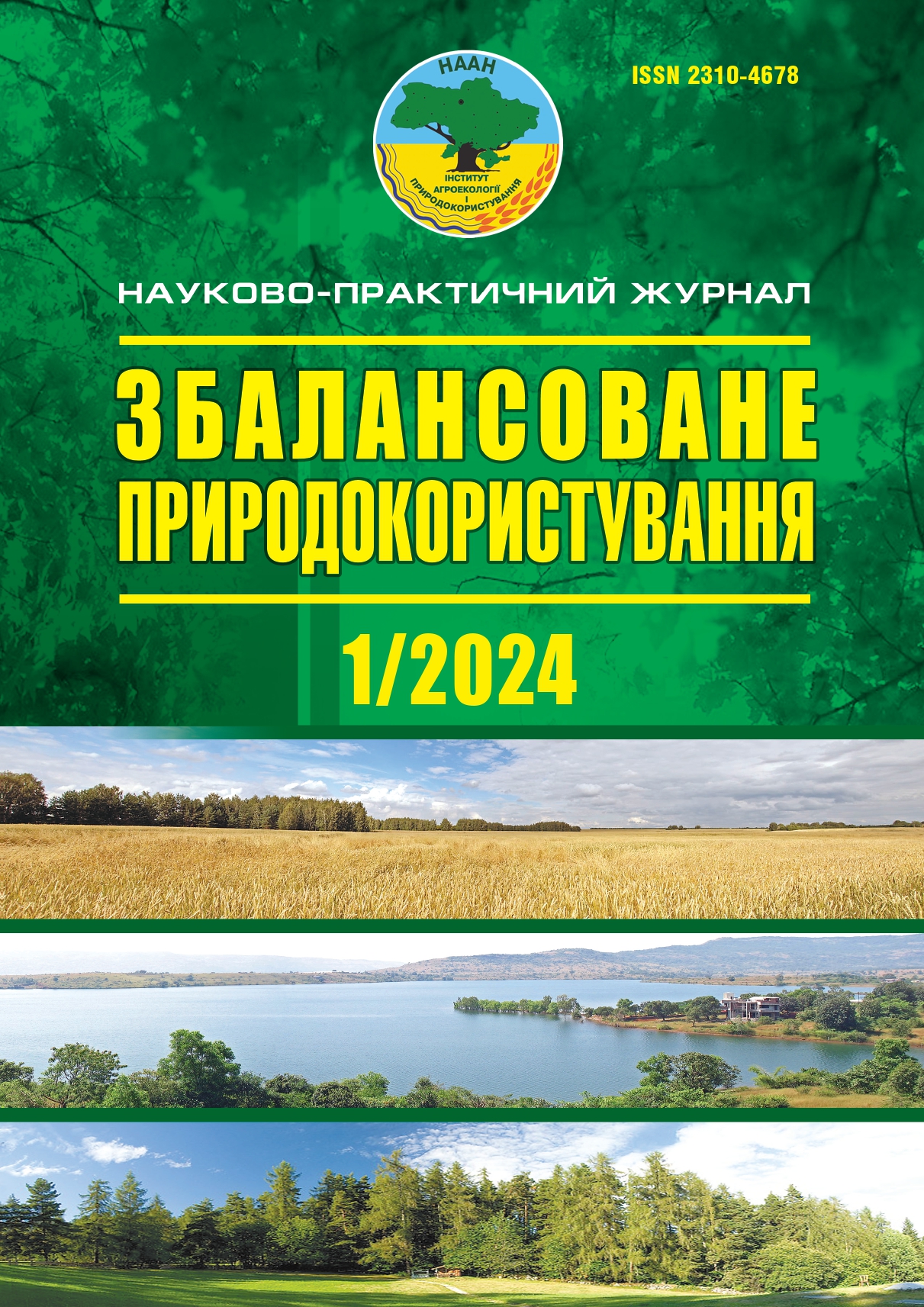Розвиток інструментарію організаційно-економічного механізму управління твердими побутовими відходами
DOI:
https://doi.org/10.33730/2310-4678.1.2024.302619Ключові слова:
вторинне ресурсовикористання, фонд екологічного підприємництва, потенціал, інтегральний індекс, територіальна громада, ефективністьАнотація
Концептуальні положення функціонування організаційно-економічного механізму управління твердими побутовими відходами базуються на процесно-функціональному підході й передбачають систематизацію та розвиток принципів, функцій, інструментів і методів його організації з урахуванням ієрархічної пріоритетності операційних процесів управління. Встановлено, що ефективне управління твердими побутовими відходами є можливим завдяки удосконаленню інструментарію організаційно-економічного механізму цього процесу в напрямі економічного стимулювання діяльності зі збирання, сортування та використання цих відходів як вторинної сировини та енергоносіїв. Інструментарій організаційно-економічного механізму управління твердими побутовими відходами передбачає застосування інструментів фінансування проєктів із фонду екологічного підприємництва, контролю за розподіленням відходів. Обґрунтовано визначення інтегрального показника потенціалу вторинного ресурсовикористання твердих побутових відходів територіальних громад і впорядкування територіальних громад із режимом найбільшого економічного та інвестиційного сприяння вторинного ресурсовикористання твердих побутових відходів. Здійснена оцінка потенціалу вторинного ресурсовикористання твердих побутових відходів територіальних громад надала змогу реагування на низьку ефективність окремих індексів і прийняття оптимальних управлінських рішень щодо покращення цих показників.
Посилання
Systemy povodzhennia z tverdymy pobutovymy vidkhodamy v ukrainskykh mistakh, rol miskoho naselennia v rozdilnomu zbyranni smittia ta rekomendatsii dlia orhaniv mistsevoho samovriaduvannia [Solid household waste management systems in Ukrainian cities, the role of the urban population in separate garbage collection and recommendations for local self-government bodies]. (2011). Kyiv [in Ukrainian].
Pro upravlinnia vidkhodamy: Zakon Ukrainy vid 28.12.2022 r., № 2849-IX [About waste management: Law of Ukraine dated 28.12.2022, no. 2849-IX]. (2022). URL: https://zakon.rada.gov.ua/laws/show/2320-20#Text [in Ukrainian].
Kolodiichuk, V., Kolodiichuk, I., Kravtsiv, V. (2022). Territorial reserves of innovative development of the waste management systems in Ukraine. Environmental Quality Management, 31, 3, 291–300 [in English].
Bobkova, A., Pavliuchenko, Yu. (2017). Uchasnyky vidnosyn u sferi ekolohichnoho pidpryiemnytstva [Participants of relations in the field of ecological entrepreneurship]. Hospodarske pravo i protses — Commercial law and process, 9, 56–61 [in Ukrainian].
Fond rozvytku pidpryiemnytstva [Entrepreneurship Development Fund]. URL: https://bdf.gov.ua/ [in Ukrainian].
Kolodiichuk, I.A. (2021). Terytoralno zbalansoavanyi pidkhid u sferi upravlinnia vidkhodamy [Territorially balanced approach in the field of waste management]. The scientific heritage, 68, 10–14 [in Ukrainian].
Stupen, N.M. (2017). Ekoloho-ekonomichnyi mekhanizm rozvytku rekreatsiinykh terytorii [Ecological and economic mechanism of development of recreational areas]. Kyiv: DCS-Center [in Ukrainian].
Harrington, E.C. (1965). The desirable function. Industrial Quality Control, 21, 10, 494–498 [in English].
Shkuratov, O. (2018). Methodology for estimation of ecological safety in the agricultural of Ukraine. Scientific Papers: Series Management, Economic Engineering in Agriculture and Rural Development, 18, 3, 379–386 [in English].
Palianychko, N.I., Furdychko, O.I. (Ed.). (2017). Finansovo-ekonomichne zabezpechennia zbalansovanoho vykorystannia zemelnykh resursiv Ukrainy [Financial and economic provision of balanced use of land resources of Ukraine]. Kyiv: DIA [in Ukrainian].
##submission.downloads##
Опубліковано
Номер
Розділ
Ліцензія
- Автори залишають за собою право на авторство своєї роботи та передають журналу право першої публікації цієї роботи на умовах ліцензії Creative Commons Attribution License, котра дозволяє іншим особам вільно розповсюджувати опубліковану роботу з обов'язковим посиланням на авторів оригінальної роботи та першу публікацію роботи у цьому журналі.
- Автори мають право укладати самостійні додаткові угоди щодо неексклюзивного розповсюдження роботи у тому вигляді, в якому вона була опублікована цим журналом (наприклад, розміщувати роботу в електронному сховищі установи або публікувати у складі монографії), за умови збереження посилання на першу публікацію роботи у цьому журналі.
- Політика журналу дозволяє і заохочує розміщення авторами в мережі Інтернет (наприклад, у сховищах установ або на особистих веб-сайтах) рукопису роботи, як до подання цього рукопису до редакції, так і під час його редакційного опрацювання, оскільки це сприяє виникненню продуктивної наукової дискусії та позитивно позначається на оперативності та динаміці цитування опублікованої роботи (див. The Effect of Open Access).


